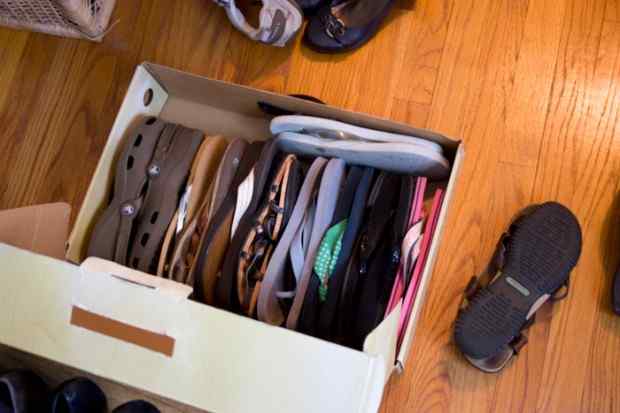Moving houses is a big event that needs detailed planning and careful handling. Among the many tasks involved in moving, packing shoes is often not given much attention. Whether you’re a shoe lover with a large collection or just someone who wants their favourite pairs to reach the new home without any damage, knowing how to pack shoes for moving is important.
Packing shoes for a move is more than just throwing them in a box and wishing for the best. It involves safeguarding fragile heels and keeping the form of your preferred sneakers. By packing your shoes with a plan, you can ensure your shoes reach your new house in perfect shape. Want more tips related to packing your shoes or a step-by-step process of how to pack shoes for moving? Read this article till the end.
Recommended Reading
Packing Your Shoes for Moving: A Step-by-Step Guide
Packing your shoes properly when moving is essential to ensure they stay protected and organised during transportation. Follow these steps to pack your shoes for moving:
Step 1: Sorting Your Shoes
Begin by gathering all your shoes in one place. This could be an ample, open space like your living room floor. Once you have all your shoes together, start examining each pair individually. You should consider factors such as the frequency of wear, comfort, and condition of the shoes. You should also consider the purpose of each pair: do you need them for work, special occasions, or everyday use?
Once you've assessed each pair, divide them into three categories: keep, donate, and discard. The 'keep' pile should include shoes you wear regularly and in good condition. The 'donate' pile can include shoes that are still wearable but you no longer require or use. Finally, the 'discard' pile should include shoes that are worn out or damaged beyond repair.
Remember, the goal is to reduce the number of shoes you need to pack, so be honest and practical in your sorting process.
Step 2: Cleaning Your Shoes
After sorting, it's time to clean your shoes. Start by removing any loose dirt or dust from the surface using a soft brush. For stubborn dirt, you may use a damp cloth or a mild soap solution. Be sure to clean the soles, as they often carry a lot of dirt.
You should consider using a leather cleaner or conditioner to maintain the material's quality for leather shoes. For suede shoes, use a special suede brush or cleaner. For canvas shoes, you can usually clean them with warm water and mild soap.
After cleaning, it's crucial to let your shoes dry completely. Moisture can lead to mould and mildew, damaging your shoes and creating unpleasant odours. Avoid drying your shoes in direct sunlight or near a heat source, which can warp the shape and fade the colour. Instead, let them air dry in a well-ventilated area.
By following these detailed steps, you can ensure that your shoes are well-organised and clean before packing, making your move smoother and more efficient.
Step 3: Gathering Packing Materials
Start by assembling all the necessary packing materials. This includes sturdy boxes, packing paper, bubble wrap, and packing tape. You can find these materials at local moving supply stores or online.
When choosing boxes, consider the size and type of your shoes. Shoe boxes are ideal because they are designed to protect shoes and can easily stack on top of each other. You can use small to medium-sized moving boxes if you still need the original shoe boxes.
Packing paper and bubble wrap are essential for protecting your shoes from scratches and impact during the move. Packing paper is excellent for wrapping individual shoes and filling empty spaces in the boxes. Bubble wrap provides extra protection for delicate shoes like high heels or dress shoes.
Lastly, you will need packing tape to secure the boxes. Make sure to tape the bottom of the boxes for added strength and seal the top once you're done packing.
Step 4: Stuffing Your Shoes
Before placing your shoes in the box, it's essential to stuff them to help maintain their shape during the move. This is especially crucial for dress shoes and high heels, which can easily be deformed. You can stuff your shoes with packing paper. Still, an eco-friendly and space-saving alternative is to use socks or other small clothing items.
Start by rolling the socks or packing paper into a ball and then gently push them into the shoe, making sure to fill out the toe area. Use more material to fill the entire shoe for boots or high-top shoes. Remember not to overstuff the shoes as it can stretch the material. The goal is to provide enough support to prevent the shoes from collapsing under pressure.
Step 5: Wrapping Your Shoes
The next step involves wrapping each shoe individually for added protection. Start by laying out a sheet of packing paper or bubble wrap on a flat surface. Place the shoe in the centre of the sheet, and then fold the packing material over the shoe, ensuring that all shoe parts are covered. Add an extra layer of packing material for shoes with heels or other delicate areas.
You can do this by cutting a small piece of bubble wrap and wrapping it around the heel or delicate area before wrapping the entire shoe. This will provide additional cushioning and prevent any damage during the move. Secure the wrapping with packing tape to ensure it stays in place. However, be careful not to apply tape directly to the shoe, as it can leave a sticky residue or damage the material.
Step 6: Packing Your Shoes
Once your shoes are wrapped, it's time to pack them into the box. Start by placing the heaviest pairs at the bottom of the box. This will create a stable base and prevent lighter shoes from being crushed. When placing the shoes in the box, try to position them so that they fit snugly without being squashed. You can place smaller shoes or flip-flops in the gaps between more giant shoes to maximise space.
Avoid overpacking the box. While it might be tempting to fit as many shoes as possible, overpacking can make your shoes squashed or deformed. Instead, aim for a comfortably full box where shoes hold each other in place but aren't under pressure.
Step 7: Labelling Your Boxes
Once all your shoes are packed, the next step is to label each box. Start by getting a marker or a pen that is easy to read and also labels for a more organised look. When labelling, be specific and detailed. Instead of just writing 'Shoes', consider including additional information such as the type of shoes (e.g., 'Running Shoes', 'Work Shoes', 'Winter Boots'), the size, or the season.
If you've packed shoes belonging to different family members in separate boxes, include the person's name on the label. Labelling is not just about writing on the box. It's also about where you place the labels. Ideally, labels should be on multiple sides of the box to be seen, regardless of how the boxes are stacked.
This will make the unpacking process easier and more efficient, as you can quickly identify the contents of each box without having to move or unstack them.
Step 8: Securing Your Boxes
After labelling, it's time to secure your boxes. This is where your packing tape comes in. Start by sealing the top flaps of the box. Make sure to apply the tape to cover all the edges and openings. This will prevent the box from accidentally opening during transit.
For added security, consider using the 'H' taping method. This involves applying tape along the middle seam of the box and then along the edges, forming an 'H' shape. This not only secures the top flaps but also strengthens the box.
Finally, give the box a gentle shake to ensure nothing moves inside. Consider adding more packing paper or bubble wrap to fill empty spaces if you hear any movement. This will ensure your shoes stay in place and are well-protected during the move.
Step 9: Choosing the Right Spot in the Moving Truck
When loading your shoe boxes into the moving truck, choosing the right spot is essential. You want to avoid placing them in areas where heavier items could crush them. A good strategy is to place your shoe boxes on top of heavier, sturdier items like furniture or appliances.
However, ensure that these items are stable and won't shift during transit, potentially causing damage to your shoes. Also, avoid placing shoe boxes near the truck's doors where they could fall out when the doors are opened. Instead, try to place them towards the middle or back of the truck, where they are less likely to be disturbed.
Step 10: Unpacking as Soon as Possible
Once you've arrived at your new home, it's advisable to unpack your shoes as soon as possible. The longer your shoes remain packed, the higher the risk of them becoming misshapen, especially if they were tightly packed or under pressure.
If you can't unpack immediately, store the boxes in a cool, dry place. Avoid areas with high humidity or temperature fluctuations, as these conditions can damage your shoes. Also, try to store the boxes in a way that doesn't put additional pressure on the shoes, such as stacking them too high or placing heavier boxes on top.
Step 11: Checking for Damage
After unpacking, take the time to check each pair of shoes for any damage. Look for signs of crushing, scuff marks, or changes in shape. If you find any damage, it could be due to improper packing, rough handling during the move, or unfavourable storage conditions.
In such cases, assess whether the damage is repairable. There are often DIY solutions or professional services available for minor scuffs or shape distortions. However, it might be time to consider replacing the shoes for severe damage.
Tips to Consider When Packing Shoes
When packing shoes for a trip, maximising space while protecting your footwear from damage is essential. Some tips to consider are:
1. Separate Shoes
Use individual or reusable bags to keep dirty shoes away from clean clothes. This helps keep your luggage clean and organised.
2. Pack Smartly
Place shoes in a way that saves space. Pack large shoes like boots or heels around the edges of your suitcase, using their shape to create a solid base.
3. Organise
If you're packing more than one pair of shoes, use a separate compartment or packing cube for them. This keeps them in one place and prevents them from moving around and messing up your packing.
How can NoBroker Help?
Packing your shoes for a move does not have to be a daunting task. By following these simple steps, you can ensure that your beloved footwear arrives at your new destination in perfect condition. Remember to declutter, use appropriate packing materials, and employ efficient packing techniques to maximise space and minimise potential damage.
NoBroker is a platform that simplifies your relocation process. We offer a range of services for both intra-city and inter-city relocations. One of the critical features of NoBroker is our best price guarantee. If you find a more competitive price elsewhere, we promise to match it or even offer a lower price, along with a service guarantee. Taking the time to pack your shoes thoughtfully will protect your investment and make the unpacking process a breeze. So, lace up those sneakers and step into your new adventure with the confidence that your shoe collection is ready to stride into the next chapter of your life. Safe travels! So, reach out to us.

